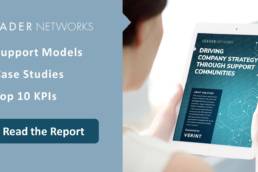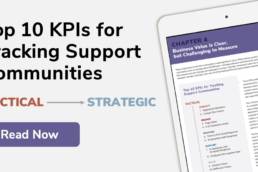When you’re searching high and low for the next big thing, or scanning the edge for the next new thing, you can miss real success stories. So here’s one to contemplate: a free, private online community serving a crucial constituency, aligned with but outside of an existing non-profit organization. And this is one of the most engaged, most active and fastest-growing communities I’ve seen in awhile. In preparation for a talk I am doing at the DigitalNow conference to a group of association executives, I came across this online community.
The American School Counselor Association (ASCA) serves professional school counselors, the individuals who work inside and outside the classroom — pre-school through college — helping our children succeed at the crucial work of learning. ASCA member benefits include state and local chapters, professional development resources, legislative advocacy, job listings, legal and ethical guidance and much more, as part of the paid member benefit. However, ASCA also offers a very special extra: ASCA SCENE, their free, private online peer support and collaboration community. And it is fantastic!
In less than four years, ASCA SCENE has grown to over 19,000 active and engaged community members, helping to drive the sponsoring organization’s membership to nearly 30,000 paying members. I’ll let ASCA Executive Director Richard Wong speak for himself on some of the key factors behind this community’s success.
Vanessa: What drove you to start this community?
Richard: We wanted a way to let our members share files such as lesion plans, programs and other things they’ve done. Our folks are eager to do that. We tried a number of things but the technology wasn’t there, so when the whole idea of social networks came along, that’s what we wanted — the technology caught up to us! The members were coming up with new things, we wanted to enable them and not control everything. We wanted to say: “We didn’t do this, your colleagues did. Have at it!”
Vanessa: Why free? Why open to all school counselors, not just ASCA members?
Richard: The community was never meant to be a money-maker or to market other products and services. It was meant to be a service itself. Initially, we didn’t know whether to limit it to our members or open it to all who are interested. ASCA’s ultimate goal is to get the information out there- we want people to create and share wonderful school programs, so we wanted to open it up to all, even those who choose not to pay us dues.
Vanessa: Were you afraid of cannibalization?
Richard: We haven’t really done an analysis to see how it has affected membership. We know that since we introduced the SCENE 3½ years ago, ASCA paid membership has grown by 5,000 members, from about 25K to 30K — during a recession, so we don’t think it’s had a negative effect.
Vanessa: How did you socialize the community?
Richard: We surveyed members and found low penetration of social network skills. We needed to help our members (median age mid-40s) get into the 21st century. They work with kids and needed to learn these skills. We are doing them a favor by forcing them to get onto our social network, a safe space where they could learn how to relate to it and help students. It’s free, safe and you don’t have to be an ASCA member.
Vanessa: How do you promote SCENE?
Richard: We promote it in the bi-monthly (print) magazine. Drive people to the community every issue. What’s new on the SCENE. We try to integrate our activities into the SCENE – we announce information on SCENE first, it’s our main communication vehicle.
One thing we believe in strongly is focusing the community on best practices — not on the association. We are here to support good school counseling, we didn’t design the community to talk about ASCA. It’s completely member-driven. They need to be able to use the information at work. We didn’t want the community to be about ASCA. It’s about school counselors.
Vanessa: Staffing?
Richard: We don’t have any dedicated staff. We have an IT person who makes sure it runs, some staff oversee content because they want to see what is happening. One person approves all member applications and takes down inappropriate content. Our Board members monitor the SCENE regularly. Members are good about policing themselves. We engaged active association members early and pre-seeded with evangelists – we made sure they were on the SCENE when we first launched and that they were supported.
Vanessa: How did you inspire so much user-generated content and member engagement on the community?
Richard: Our folks were very eager. They wanted a way to share their info and brag about good work, such as an anti-bully program. ‘It worked, here it is, take it and use it!’ We have many graduate students; the younger folks really latched onto this and drove early engagement. They posted a lot and asked for help from the senior folks, who come out of the woodwork to help.
Vanessa: How have ASCA benefited from the community?
Richard: Through the monitoring we will periodically say there is a lot of chatter about school climate or whatever, and pull the topic into the magazine or a conference. A more direct way is our resource center, independent of the SCENE. When people make a formal question, we respond and put it out on our website. We have a staff that monitors the SCENE resources, asks for permission, does a review process, and then puts that into our resource center. This was one of the original purposes of the SCENE, to get submissions and grow our resource center.
We needed a bully policy, we needed a conflict resolution policy. We got very few in response to earlier requests on the website, but once the SCENE was going, we got tons!
Vanessa: What challenges do you face, even though you are succeeding?
Richard: We want to grow a lot more, 19K is great but we have 30K members of the association. We are hitting a small percent of universe. Some of the other groups have 30-40K in their networks. We want to grow it in a way that is manageable for us without a dedicated staff. Without revenue we can’t have a dedicated staff. As the volume of information grows, we also need to make sure information is accurate and vibrant. We would like to explore ways to incorporate the different things we do – they tend to be somewhat siloed (Twitter, Facebook, conference app) but we need to tie them together.
Vanessa: What were the unanticipated outcomes from the SCENE?
Richard: We didn’t imagine the level and scale; meeting such an un-met need. The community definitely helped raise the awareness of our organization by allowing people to be active in the association even if they are not an official member. The community generated a lot of buzz among professionals and graduate students. Also, most graduate students join the association and we give them liability insurance — which they need anyway. And, happily we’ve won numerous awards for the SCENE.
The reason why I share this community case study is a best practice. Here is my assessment of why it succeeds:
- It identified an unmet need and serviced it clearly, with integrity
- Timing was paramount – the topics school counselors focus on are complex and they need each other
- The community was allowed to grow organically and focused on the members, not on ASCA
- Size matters – it served a large but focused audience
- It is evolving – features and focus ebb and flow based on member needs
- There is a clear mission and vision for the members to convene (on and off line)


